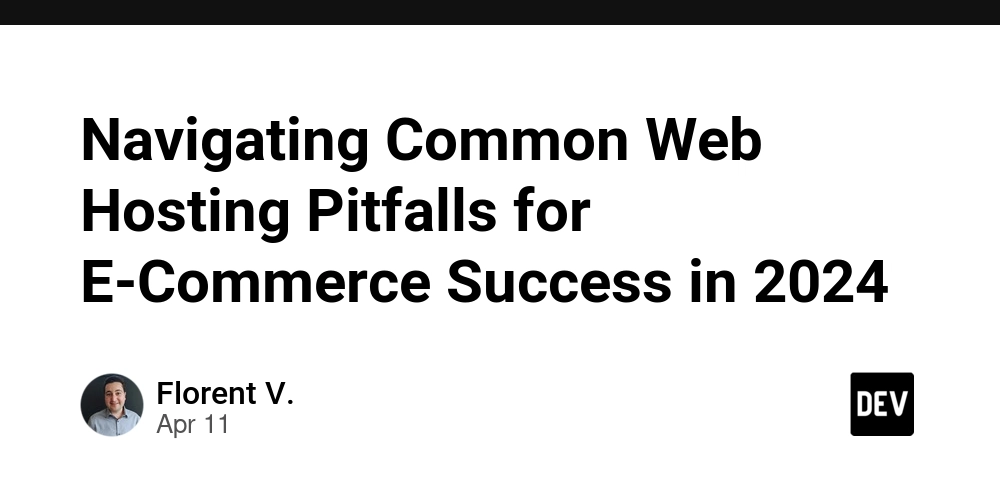Navigating Common Web Hosting Pitfalls for E-Commerce Success in 2024
Navigating Common Web Hosting Pitfalls for E-Commerce Success in 2024 In the fast-paced world of e-commerce, your web hosting provider can make or break your business. As we step into 2024, it's essential to understand the common pitfalls that can hinder your online success. Many freelancers, developers, and business owners often overlook the critical role that hosting plays in their e-commerce platforms. This article will guide you through the essential aspects of web hosting that can enhance your site’s performance and keep your customers engaged. Understanding the Importance of Performance Web hosting performance directly impacts the user experience. Slow loading times can drive potential customers away and negatively affect your search engine rankings. According to Google, the probability of users bouncing from your site increases by 32% if the loading time increases from one to three seconds. Here are key performance metrics to consider: Uptime Guarantee: Look for a hosting provider that offers at least 99.9% uptime. Downtime means lost sales and frustrated customers. Page Load Speed: Aim for a hosting solution that promises fast load times. This can be influenced by server location, resource allocation, and technology stack. Scalability: As your business grows, your hosting needs will change. Choose a hosting plan that can scale seamlessly with your business. Opting for a Virtual Private Server (VPS) or dedicated hosting can be beneficial for e-commerce sites. For instance, Liquid Web offers high-performance VPS solutions that cater to the demanding needs of e-commerce. Avoiding the Costly Mistakes Choosing the wrong hosting provider can lead to significant setbacks. Here are some common mistakes to avoid: Ignoring Customer Support: When issues arise, you need a hosting provider with responsive customer support. Look for 24/7 support via multiple channels—chat, phone, and email. Overlooking Security Features: E-commerce websites are prime targets for cyber attacks. Ensure that your hosting provider offers robust security features such as SSL certificates, firewalls, and regular backups. Choosing Price Over Quality: While budget is important, don’t sacrifice performance for a lower price. Cheap hosting often leads to slow speeds and poor service. Invest in quality hosting that aligns with your business goals. Not Understanding Terms of Service: Read the fine print. Some hosting providers have hidden fees or restrictive policies that can impact your operations. Failing to Test Your Site: After migrating to a new host, thoroughly test your site to ensure everything functions correctly. Check for broken links, slow load times, and any potential bugs that may affect the user experience. Essential Features for E-Commerce Hosting When selecting a hosting provider for your e-commerce site, certain features can significantly enhance your business operations: Integrated Payment Solutions: Choose a hosting service that supports secure payment gateways. This can simplify the checkout process and enhance user trust. Content Delivery Network (CDN): A CDN can significantly improve your site speed by caching your content across multiple servers worldwide. This is crucial for reaching a global audience. Regular Backups: Ensure your hosting provider offers automated backups. This ensures that your data is safe and can be restored quickly in case of an emergency. User-Friendly Control Panel: An intuitive control panel can save you time and hassle when managing your website. Look for options that simplify tasks like updates, backups, and security management. Email Hosting: Professional email accounts associated with your domain can increase your credibility. Check if your hosting plan includes email hosting services. By navigating these common pitfalls and focusing on the right features, you can set your e-commerce business up for success in 2024. The right web hosting provider will not only enhance your site's performance but also equip you with the tools necessary to thrive in a competitive market.

Navigating Common Web Hosting Pitfalls for E-Commerce Success in 2024
In the fast-paced world of e-commerce, your web hosting provider can make or break your business. As we step into 2024, it's essential to understand the common pitfalls that can hinder your online success. Many freelancers, developers, and business owners often overlook the critical role that hosting plays in their e-commerce platforms. This article will guide you through the essential aspects of web hosting that can enhance your site’s performance and keep your customers engaged.
Understanding the Importance of Performance
Web hosting performance directly impacts the user experience. Slow loading times can drive potential customers away and negatively affect your search engine rankings. According to Google, the probability of users bouncing from your site increases by 32% if the loading time increases from one to three seconds. Here are key performance metrics to consider:
- Uptime Guarantee: Look for a hosting provider that offers at least 99.9% uptime. Downtime means lost sales and frustrated customers.
- Page Load Speed: Aim for a hosting solution that promises fast load times. This can be influenced by server location, resource allocation, and technology stack.
- Scalability: As your business grows, your hosting needs will change. Choose a hosting plan that can scale seamlessly with your business.
Opting for a Virtual Private Server (VPS) or dedicated hosting can be beneficial for e-commerce sites. For instance, Liquid Web offers high-performance VPS solutions that cater to the demanding needs of e-commerce.
Avoiding the Costly Mistakes
Choosing the wrong hosting provider can lead to significant setbacks. Here are some common mistakes to avoid:
Ignoring Customer Support: When issues arise, you need a hosting provider with responsive customer support. Look for 24/7 support via multiple channels—chat, phone, and email.
Overlooking Security Features: E-commerce websites are prime targets for cyber attacks. Ensure that your hosting provider offers robust security features such as SSL certificates, firewalls, and regular backups.
Choosing Price Over Quality: While budget is important, don’t sacrifice performance for a lower price. Cheap hosting often leads to slow speeds and poor service. Invest in quality hosting that aligns with your business goals.
Not Understanding Terms of Service: Read the fine print. Some hosting providers have hidden fees or restrictive policies that can impact your operations.
Failing to Test Your Site: After migrating to a new host, thoroughly test your site to ensure everything functions correctly. Check for broken links, slow load times, and any potential bugs that may affect the user experience.
Essential Features for E-Commerce Hosting
When selecting a hosting provider for your e-commerce site, certain features can significantly enhance your business operations:
Integrated Payment Solutions: Choose a hosting service that supports secure payment gateways. This can simplify the checkout process and enhance user trust.
Content Delivery Network (CDN): A CDN can significantly improve your site speed by caching your content across multiple servers worldwide. This is crucial for reaching a global audience.
Regular Backups: Ensure your hosting provider offers automated backups. This ensures that your data is safe and can be restored quickly in case of an emergency.
User-Friendly Control Panel: An intuitive control panel can save you time and hassle when managing your website. Look for options that simplify tasks like updates, backups, and security management.
Email Hosting: Professional email accounts associated with your domain can increase your credibility. Check if your hosting plan includes email hosting services.
By navigating these common pitfalls and focusing on the right features, you can set your e-commerce business up for success in 2024. The right web hosting provider will not only enhance your site's performance but also equip you with the tools necessary to thrive in a competitive market.







































































